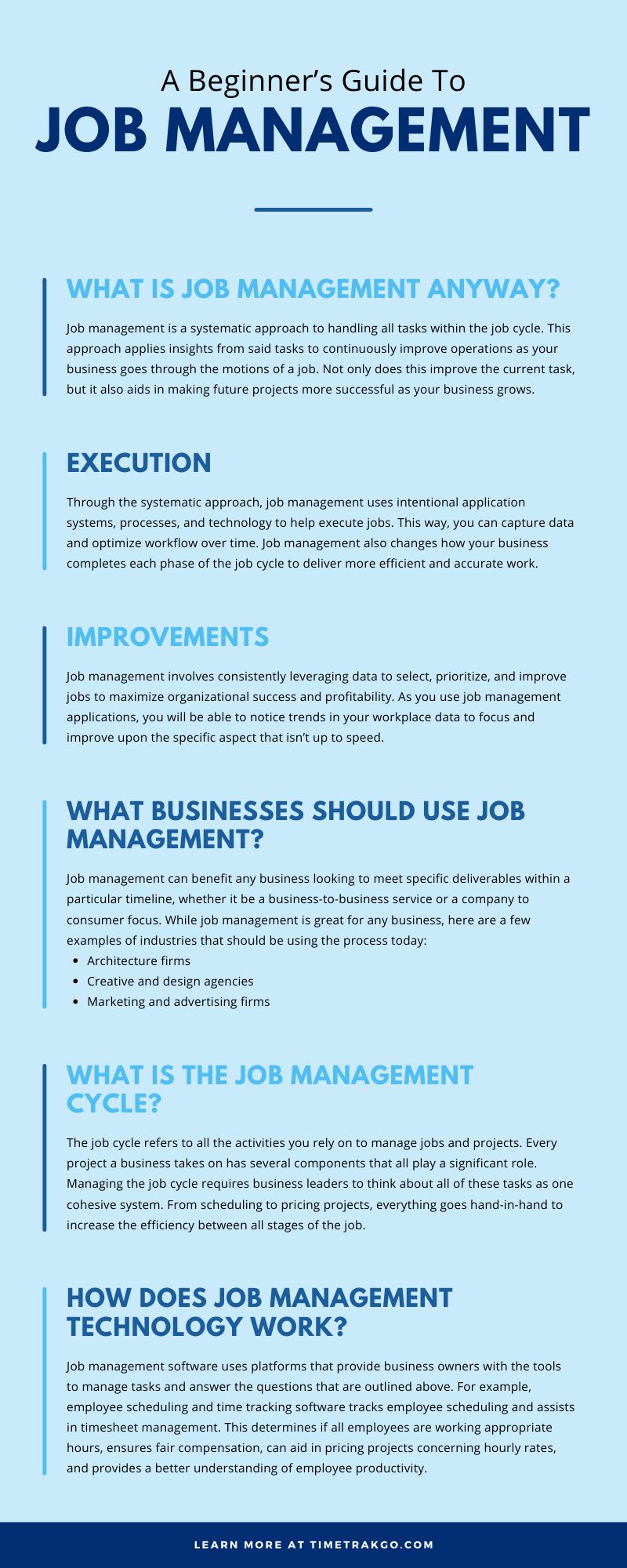The goal of every new business is to hit the ground running by offering the best products and services. While making your mark on the industry early on is vital to success, overlooking the behind-the-scenes processes can hinder your business. From juggling spreadsheets, emails, HR resources, and employee communication, optimization is the key to running a productive and efficient company, and job management for beginners is the way to make it happen.
Without proper optimization, you run the risk of wasting time, making simple errors, and wasting money as a result. You may be wondering what the best way to optimize your business’s workflow might be—the answer is job management systems. This beginner’s guide to job management will tell you all you need to know about the concept to implement it into your business.
What Is Job Management Anyway?
Job management, or task management, for beginners is a systematic approach to handling all tasks within the job cycle. This approach applies insights from said tasks to continuously improve operations as your business goes through the motions of a job. Not only does this improve the current task, but it also aids in making future projects more successful as your business grows.
Execution
Through the systematic approach, job management uses intentional application systems, processes, and technology to help execute jobs. This way, you can capture data and optimize workflow over time. Job management also changes how your business completes each phase of the job cycle to deliver more efficient and accurate work.
Improvements
Job management involves consistently leveraging data to select, prioritize, and improve jobs to maximize organizational success and profitability. As you apply your skills in job management for beginners, you will be able to notice trends in your workplace data to focus and improve upon the specific aspect that isn’t up to speed.
What Businesses Should Use Job Management?
Job management can benefit any business looking to meet specific deliverables within a particular timeline, whether it be a business-to-business service or a company to consumer focus. While job management is great for any business, here are a few examples of industries that should be using the process today:
- Architecture firms
- Creative and design agencies
- Marketing and advertising firms
- Consultancies
- Construction and development services
- Engineering firms
- IT services
- Accounting and bookkeeping firms
What Is the Job Management Cycle?
The job cycle refers to all the activities you rely on to manage jobs and projects. Every project a business takes on has several components that all play a significant role. Managing the job cycle requires business leaders to think about all of these tasks as one cohesive system. From scheduling to pricing projects, everything goes hand-in-hand to increase the efficiency between all stages of the job.
Understanding your business’s job management cycle is a vital step in aligning your business and goals. Every business is unique and will have its own specific job cycle that meets its needs. For example, one you may heavily focus on estimates while another company uses pricing quotes.
Likewise, the longevity of your business will determine what tasks are part of your cycle. For example, a new company may not need to implement employee performance reporting just yet. Regardless of the stage your business is in, these are some of the everyday activities businesses rely on to manage jobs. If you’re thinking of implementing job management for beginners within your company, you should take a more in-depth look at these common points in the cycle:
- Lead and customer relationship management. How does your team track leads? How do you capture lead data from your website and use that data to create quotes or estimates? How does your business manage all lead contacts in your database?
- Quotes, estimate, and budget management. How do you convert a quote or estimate into an active job? How do you measure your budget during active jobs?
- Task management. How do you assign tasks to employees? How do your employees know which tasks they need to complete and how much time should be allocated to each job?
- Scheduling and timesheet management. How do you schedule tasks for employees, and how do you track employee time? How do you use employee timesheet data to understand productivity rates and time management?
- Email and document management. How does your team manage documents, share all information related to a client or job, and communicate on a day-to-day basis?
- Purchase and cost management. How do you track and allocate costs? How do you track purchase orders?
- Work-in-progress management. How do you ensure that all your current jobs get invoiced out? How do you identify and fix issues before the job is complete?
- Invoice and payments management. How do you invoice and collect payment from clients? How do you sync financial data to your accounting system?
- Reporting. How do you report on jobs and get insight into your clients? How do you measure employee productivity? How do you know if your jobs are running on par with the budget?
How Does Job Management Technology Work?
Job management software uses platforms that provide business owners with the tools to manage tasks and answer the questions that are outlined above. For example, employee scheduling and time tracking software tracks employee scheduling and assists in timesheet management. This determines if all employees are working appropriate hours, ensures fair compensation, can aid in pricing projects concerning hourly rates, and provides a better understanding of employee productivity.
What Are the Benefits of Job Management Systems?
There is an extensive list of benefits associated with using job management software systems. Here are just a few of the most important benefits:
- Streamlined procedures and increased process efficiency
- Accurate and real-time data capture
- Seamless flow of data throughout the entire job cycle
- Critical business insight into all aspects of your jobs
- Easy collaboration between team members
- Real-time error reduction
The type of job management system your business needs will depend on your specific goals and business processes. No matter what kind of job management system you need, it will undoubtedly help your business complete jobs more efficiently. Use this guide on job management for beginners to get an idea of what task within your job cycle will benefit from a job management system.






